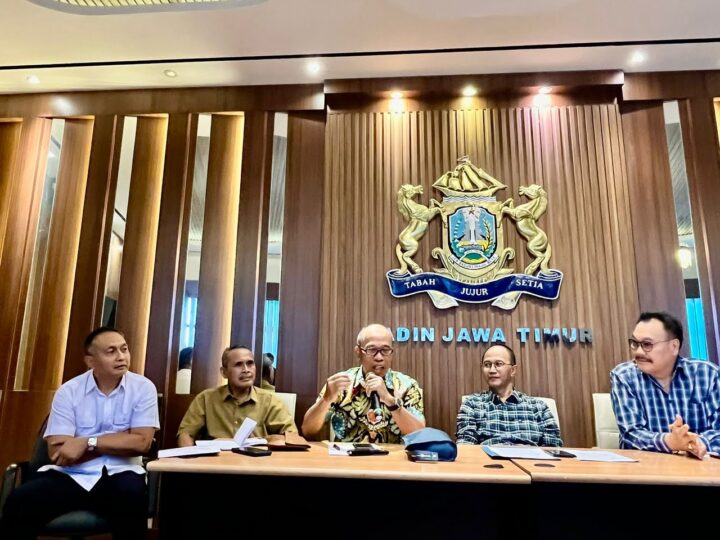
The East Java Chamber of Commerce and Industry (Kadin) together with the Surabaya Association of Indonesian National Shipping Owners (INSA), the East Java Association of Indonesian Export Companies (GPEI), the Tanjung Perak Land Transport Organisation (Organda), the East Java Association of Logistics and Forwarders (ALFI) and the East Java Association of All Indonesian National Importers (GPEI) requested that the Draft Ministerial Regulation (RPM) on Port Tariffs for changes to PM Transportation Number 121/2018 derived from Law 17/2008 article 110 be reviewed.
Chairman of the East Java Chamber of Commerce and Industry, Adik Dwi Putranto revealed that the RPM on Port Tariffs by the Minister of Transportation which will replace PM Transportation 121/2018 is not in line with the government's spirit to reduce logistics costs in the country.
‘The existing regulation in 121/2018 is correct, when raising tariffs must involve associations in port. This is the right collaboration. But now there is a proposal from the Government, in this case the Minister of Transportation, which will eliminate the collaboration, remove mutual cooperation, so that the Port Business Entity (BUP) can raise tariffs at will, which will have an impact on the high cost of logistics. This is counterproductive and must be addressed before it is approved,’ said Adik in Surabaya, Friday (23/8/2024).
Adik believes the government understands the rejection considering that the government's roadmap is to reduce logistics costs so that the competitiveness of Indonesian products will increase. ‘It is only the sensitivity of the Ministry of Transportation on this matter that we question because the proposal is very troubling for logistics businesses in the country,’ said Adik.
For this reason, Kadin Jatim will immediately send a letter to President of the Republic of Indonesia Joko Widodo in the next week and will also conduct a ‘hearing’ with the House of Representatives (DPR) of the Republic of Indonesia (RI).
‘Next week we will send a letter to the President which we will copy to the Minister of Transportation and the Minister of BUMN. I am sure Mr Jokowi understands what we feel because he used to be a timber businessman who had exported,’ he said.
The same thing was also expressed by INSA Surabaya Chairman Stenven H. Lasawengen that in PM Transportation number 17/2018 it is confirmed that to change the tariff class, before it is approved, it must ask for the approval of the relevant association.
‘But currently there is a massive movement that will eliminate the involvement of the association. If the article is removed, then the tariff increase at the port will be uncontrolled. This movement must be stopped because it will result in a tremendous increase in logistics tariffs,’ said Stenvens Lesawengen.
Furthermore, Tanjung Perak Organda Chairman Kody Lamahayu said that the association has been partially controlling BUP, especially Pelindo. ‘If there is no us, the tariff will be raised arbitrarily, as happened in Teluk Lamong,’ he said.
If rule 17/2018 is eliminated, he is worried that handling rates at all ports will be raised like at Teluk Lamong. ‘The government is currently reducing logistics costs, but the government is also releasing rules that can increase logistics costs,’ he said.
According to GPEI Chairman Isdarmawan Asrikan, the role of logistics is very important in the national economy, because logistics is the ecosystem of goods movement. ‘And in eastern Indonesia, especially East Java, most of them go through Tanjung Perak, both exports and imports or domestic trade,’ said Isdarmawan.
So far, he continued, the role of industry in East Java exports is very large, reaching 90% of total East Java exports. Meanwhile, 70% of raw materials for domestic industrial production are imported from abroad. ‘So the role of the Tanjung Perak port is very important for economic movement in East Java. If tariffs at the port, especially Tanjung Perak, rise, our logistics index performance will fall further. Even though currently our index is already inferior to neighbouring countries such as Thailand and Malaysia. For this reason, the role of the association must continue to be fought for so that our index performance does not drop further,’ he said.
ALFI East Java Chairman Sebastian Wibisono also confirmed that in Jakarta, all DPP Associations have sent letters to the Ministry of Transportation. For businesses, this rejection is a necessity in order to achieve a golden Indonesia in 2045.
‘For this reason, we in East Java are also closing ranks because this is very irrelevant, where the government is trying to reduce logistics costs but monopolies are also raised,’ said Wibisono. He hopes there is government sensitivity not to change the rules that are already correct.
On the same occasion, GINSI East Java Vice Chairman for Organisation and Membership Medy Prakoso emphasised that the public, including associations, are the controllers and balancers.
‘If the government is not controlled, then the government will run wild. The government must know that we have hope. And as a controller, we must provide input to make Indonesia more advanced,’ he concluded.
National Economy
Regional Economy